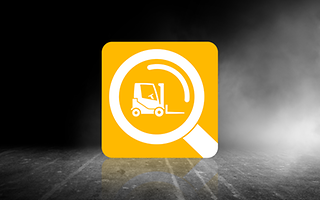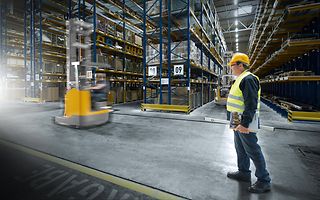- Chairman of the Board of Management Dr Lars Brzoska: “We want to become more profitable, more efficient and more sustainable.”
- Sales target of over €5 billion for 2025 including potential M&A activities in the mid- to high three-digit million euro range
- Automation, digitalisation and energy systems as key growth areas
- Expansion of global presence with focus on Europe, China and North America
- Optimisation and digitalisation of internal processes to increase efficiency
- Anchoring sustainability as a foundation for all Group activities
After the Group had already achieved its strategic growth target for 2020 one year earlier than planned, Jungheinrich’s new strategy aims to create even greater, sustainable value in the coming years for its stakeholders, including customers, employees, shareholders, business partners and society.
In technological terms, Jungheinrich is focusing on the innovation of automation, digitalisation and future-oriented energy systems. The implementation of customer-centred and more efficient processes is being driven forward as part of the company’s digital transformation, which has already been initiated. The Group is focusing in particular on expanding its presence in the markets of Europe, China and North America. All activities will be based on a holistic understanding of sustainability that takes equal account of economic, ecological and social aspects.
The Group’s 2025+ strategy is divided into 12 sub-strategies, which in turn are implemented in around a hundred specific initiatives within the company. All Group divisions are involved in the implementation with clearly defined roles and responsibilities. The strategy is to be extended dynamically beyond 2025.
“Our intention is to be our customers’ first choice over the long term, offering them added value through forward-looking solutions and technologies. At the same time, we as a Group want to help shape economic, ecological and social developments, creating sustainable value for all our stakeholders. To achieve this, we are making Jungheinrich more profitable, more efficient and more sustainable,” explains Dr Lars Brzoska, Chairman of the Board of Management at Jungheinrich AG. “Our 2025+ strategy means we have fully charged our batteries in all aspects, bundled ideas and strengths, and set the course for a bright future in intralogistics.”
On the basis of its 2025+ strategy, Jungheinrich is aiming for revenue of over €5 billion for the 2025 financial year. Jungheinrich has earmarked a sum in the mid- to high three-digit million euro range for targeted acquisitions and strategic partnerships. Organic revenue is expected to exceed €4.6 billion, based on an annual growth rate of at least 5 per cent. EBIT ROS is to be improved to over 8 per cent and EBT ROS to over 7.5 per cent. By 2025, EBT per employee is expected to exceed €17,500. The aim is to increase the cash flow from operating activities to between 8 and 10 per cent. The share of non-European revenue is to be increased to over 20 per cent.
Dr Volker Hues, Member of the Board of Management, Finance: “With our 2025+ strategy we are laying the foundation for the long-term success of our Group. Jungheinrich already has a very sound balance sheet and a high liquidity reserve. With our focus on return on investment and operating cash flow, we are securing our financial flexibility. Thus, even in economically difficult times, we are always in a position to implement the necessary strategic measures and guarantee the financial independence of the Group. At the same time, we are adhering to our policy of continuous dividend payments.”
Further information on the 2025+ strategy
In its 2025+ strategy, Jungheinrich is anchoring the automation of intralogistics as a central future area of growth for the Group. Jungheinrich expects annual market growth of between 7 and 10 per cent in this area. Against this background, the company is pushing ahead with the expansion of its automation portfolio, particularly in the areas of automated guided vehicles, automated warehouses, software and robotics. The aim is to open up new markets and to achieve an even stronger market position, especially in e-commerce. To strengthen our own market position, cooperation with partners from various industries will be further intensified and targeted acquisitions will be sought. The Group is intensifying its activities in the area of digitalisation as well and is pushing the development of new product and business models in this area. Priority is being given to the consistent further development of the “digital warehouse” with the aid of artificial intelligence and Big Data, among other things. “Intralogistics is a pioneer in automation and digitalisation, making it a pace-setter for the far-reaching changes that industry, transport and trade are currently undergoing. Jungheinrich has long been a driver of innovation here. We will be consistently exploiting the growth potential in this segment from this position,” explains Brzoska. Jungheinrich is expanding its range of digital products in the field of warehouse, fleet and battery management systems, and plans to expand its portfolio of safety and assistance systems.
Jungheinrich is already the number one in warehouse electrical efficiency and has a leading position within the industry in developing innovative energy systems. More than 1,000,000 Jungheinrich electric trucks are currently in use around the world. No other company in intralogistics relies so consistently on the lithium-ion battery. Jungheinrich intends to further extend its industry lead in this technology. The company’s goal is to achieve a lithium-ion equipment ratio of over 70 per cent by 2025 among the trucks it sells. To this end, further truck models with fully integrated lithium-ion batteries will be launched on the market in the coming years. Jungheinrich also sees great growth potential in the Powertrain Solutions division. Here, the company is also making its expertise in the field of energy systems available to other manufacturers, including those in the construction and agricultural machinery industry, and is thus driving forward electric mobility across all sectors. Brzoska adds that, “Driven by our decades of experience as a supplier of electric trucks, we are changing the future, including beyond intralogistics. Both our customers and the environment benefit equally from our expertise in efficient and climate-friendly lithium-ion technology.”
In order to expand its global presence, Jungheinrich will in future place particular focus on its activities in the markets of Europe, China and North America. Together these account for around 80 per cent of the world market in intralogistics. The company plans to increase the share of its revenue outside Europe to over 20 per cent. Jungheinrich has earmarked a sum in the mid- to high three-digit million euro range in its 2025+ strategy for targeted acquisitions and strategic partnerships. “In future, strategic partnerships and acquisitions will be an important lever for us to achieve our goals. To this end, we are planning a considerable investment volume and intend to concentrate primarily on growth markets,” says Dr Lars Brzoska.
With its 2025+ strategy, Jungheinrich is also accelerating its own digital transformation. The aim is to consistently increase efficiency within the Group. In this context, all processes and structures of the company will be reviewed and optimised to increase Jungheinrich’s profitability and effectiveness. To this end, the ongoing projects DEEP (Digital End-to-End Processes) and N-Ex-T (Network -Excellence Technics) in particular will be advanced. “Efficient processes help to save resources and simultaneously increase competitiveness. By doing the right things better, we increase our profitability in the long term,” says Brzoska.
In its 2025+ strategy, Jungheinrich takes a holistic view of sustainability in its economic, ecological and social dimensions. Brzoska explains that, “For Jungheinrich as a family business, assuming corporate responsibility means combining social and ecological aspects with profitable growth. This self-image drives us to shape the future of our industry.” Within the mechanical engineering industry, Jungheinrich is already among the most sustainable 2 per cent of companies. Our 2025+ strategy now even more firmly anchors the topic of sustainability within the company, setting out ambitious goals. In this context, Jungheinrich has joined the 50 Sustainability & Climate Leaders initiative in order to lead the fight against climate change alongside other international groups. As part of this, Jungheinrich has set itself the goal of achieving CO2 neutrality. By introducing systematic sustainability management along the entire supply chain, the Group is defining clear responsibilities and creating transparency for greater sustainability. In addition, Jungheinrich intends to position itself as an employer of choice in the coming years. The proportion of women among management staff will also be increased significantly.





